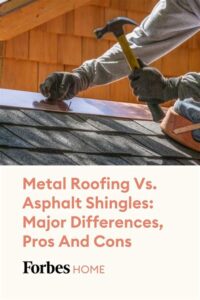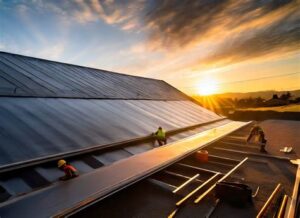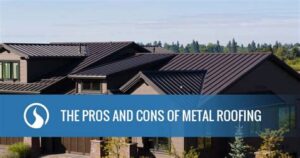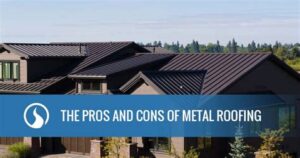Welcome to our insightful exploration of metal deck roofing, a choice that combines durability with modern efficiency. In this article, we’ll unveil 10 fascinating facts that highlight the benefits and features of metal deck roofs, from their structural integrity to their energy efficiency. Whether you’re a homeowner, builder, or architect, understanding these essential aspects will empower you to make informed decisions when considering metal deck roofing. We’ll also delve into practical tips for maintenance and factors to consider when selecting your options. Get ready to discover the many ways metal deck roofs can enhance your property’s value and longevity, while providing a sustainable and reliable roofing solution. Let’s dive in!
10 Things About Metal Deck Roofs That Enhance Structural Integrity
Metal deck roofs are renowned for their strength and durability, making them a popular choice in modern construction. Here are 10 things that highlight how these roofs enhance structural integrity:
Metal deck roofs play a critical role in enhancing the structural integrity of buildings, making them a wise choice for both residential and commercial applications. Understanding these 10 things can help you appreciate their benefits even more.
Understanding 10 Things That Make Metal Deck Roofs Energy Efficient
Metal deck roofs are increasingly recognized for their energy efficiency, contributing to lower energy bills and a reduced carbon footprint. Here are 10 things you might not know about how these roofs enhance your home’s energy efficiency:
- Reflective Properties: Metal roofs can be coated with reflective materials that deflect sunlight. This helps in keeping the building cooler, especially during warm months.
- Insulation Compatibility: Metal deck roofs can accommodate various types of insulation materials, improving thermal resistance and overall energy efficiency.
- Ventilation Systems: Properly designed ventilation systems in metal roofs assist in regulating temperature and moisture levels, further enhancing energy efficiency.
- Durable Materials: The longevity of metal roofing materials means less frequent replacements, leading to lower energy consumption over time.
- Lightweight Design: The lightweight nature of metal roofs requires less structural support, allowing for efficient design that minimizes resource use.
- Green Certifications: Many metal roof products come with eco-friendly certifications, indicating their compliance with energy efficiency standards.
- Cool Roof Technology: Some metal roofs are available with ‘cool roof’ technology, which enhances their ability to reflect sunlight and absorb less heat.
- Sealed Joints: The tight seals of metal deck roofs prevent air leaks, reducing energy loss through the building envelope.
- Recyclability: The recyclability of metal roofing materials means that less energy is consumed in producing new roofing materials, supporting sustainable building practices.
- Energy Star Certifications: Many metal roofing options meet or exceed Energy Star requirements, promoting energy-saving benefits when selected for home or commercial buildings.
By understanding these 10 things about metal deck roofs, homeowners and builders can make informed decisions that enhance energy efficiency, leading to cost savings and environmental benefits.
10 Things To Consider When Choosing Metal Deck Roofing Options
Choosing the right metal deck roofing option can significantly impact the performance and longevity of your structure. Here are 10 things you should keep in mind to make an informed decision:
By considering these 10 things, you can select the most appropriate and effective metal deck roofing option for your needs, ensuring a sound investment for your building’s future.
Exploring 10 Things That Promote Longevity in Metal Deck Roofs
Metal deck roofs are known for their durability, but maintaining their longevity requires specific practices and considerations. Here are 10 things that can help extend the life of your metal deck roof:
By incorporating these 10 things into your maintenance routine, you can significantly enhance the longevity of your metal deck roof and ensure it serves its purpose effectively for many years to come.
10 Things Experts Recommend for Maintaining Your Metal Deck Roof
Maintaining your metal deck roof is essential for ensuring its longevity and performance. Here are 10 things that experts recommend to keep your roof in top condition:
- Regular Inspections: Conduct inspections at least twice a year and after severe weather events to identify potential issues early.
- Clean Debris: Remove leaves, branches, and other debris from the roof surface and gutters to prevent water buildup and corrosion.
- Check for Rust: Inspect for signs of rust or corrosion and address them promptly using appropriate rust treatment methods.
- Seal Joints and Fasteners: Regularly check all seams, joints, and fasteners for any signs of wear or leakage and apply sealant as needed.
- Maintain Paint Coating: If your metal roofing has a protective paint coating, monitor its condition and reapply as necessary to prevent rust.
- Trim Overhanging Branches: Keep tree branches trimmed to prevent damage from falling branches and to reduce debris accumulation.
- Ensure Proper Drainage: Make sure all drainage systems, including downspouts, are clear and functioning to prevent water pooling.
- Check Insulation: Inspect insulation for signs of moisture or decay, as this could impact the roof’s energy efficiency.
- Address Leaks Immediately: Any signs of leaks should be addressed quickly to prevent structural damage or mold growth underneath.
- Document Maintenance: Keep a maintenance log to track inspections, repairs, and any issues for future reference.
By following these expert recommendations, you can significantly extend the life of your metal deck roof and maintain its performance over the years.
Frequently Asked Questions
What is a metal deck roof?
A metal deck roof is a structural roofing system made of metal materials, typically steel or aluminum, providing durability, weather resistance, and a modern aesthetic.
What are the benefits of using a metal deck roof?
Metal deck roofs offer various benefits, including longevity, low maintenance requirements, energy efficiency, and resistance to harsh weather conditions.
How does a metal deck roof compare to traditional roofing materials?
Compared to traditional materials like asphalt or wood, metal deck roofs are more durable, can withstand severe weather, and often have a longer lifespan, making them a cost-effective choice.
Are metal deck roofs eco-friendly?
Yes, many metal deck roofs are made from recycled materials, and they are 100% recyclable at the end of their use, which contributes to sustainable building practices.
What types of metal are commonly used for deck roofing?
Common metals used for deck roofing include galvanized steel, stainless steel, aluminum, and copper, each offering different benefits and aesthetic options.
Can a metal deck roof be installed over existing roofing?
Yes, in many cases, a metal deck roof can be installed over existing roofing materials, providing an efficient way to improve insulation and aesthetics without complete removal.
What maintenance is required for a metal deck roof?
Metal deck roofs generally require minimal maintenance, such as periodic inspections, cleaning debris, and checking for rust or damage, ensuring long-lasting performance.





